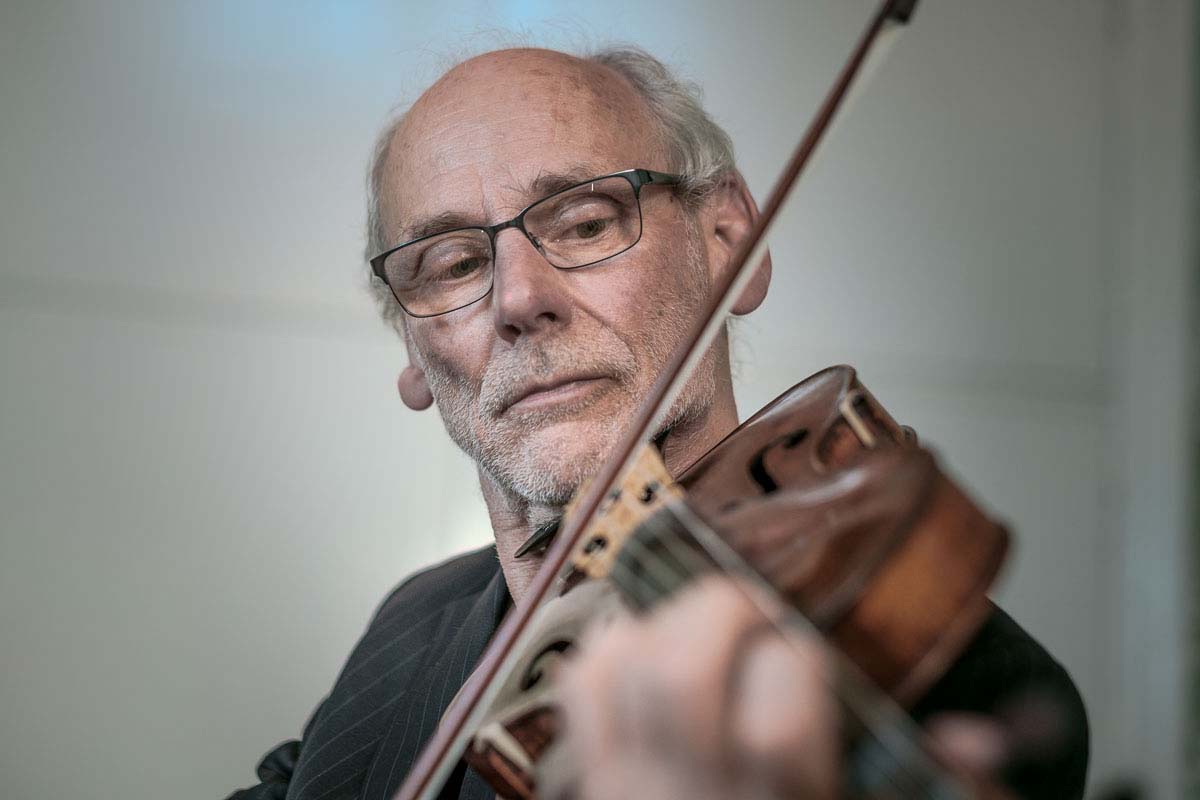Alan George is a professional viola player who co-founded the world-renowned Fitzwilliam String Quartet in 1968. He still plays in the group today, making him the longest-serving member of a professional string quartet in the UK.
The group were previously the resident string quartet at the University of York, and worked with the Russian composer Dmitri Shostakovich, one of the most well-known composers of the twentieth century. George still lives in York and remains involved with the city’s music scene, both as a viola player and as conductor of the Academy of St Olave’s, York’s leading chamber orchestra.
It’s a bright December day as I make my way to George’s house. I now sit opposite him at his wooden table, a cup of tea in hand. His cat plonks herself onto my lap. She remains there throughout the entirety of the interview, purring. My mug has two bars of music painted onto it, setting the musical tone of our conversation perfectly.
The Fitzwilliam Quartet was initially founded by George and three other Cambridge students in 1968.
George puts their incredible success in evolving into a professional quartet down to a combination of dedication and luck: “We were just lucky! When I was an undergraduate there were lots of student groups in Cambridge, and we were certainly not the best of them… I suppose our main virtue was that we stuck with it.” George responds modestly to my suggestion that their musicianship must have played a significant part.
The time the Fitzwilliam Quartet spent at the University of York was of great significance to the group. The quartet began their residency in York in 1971, only eight years into the University’s existence.
George praises Wilfred Mellers, the head of the University’s music department at that time: “he wanted to teach music through the doing of it, not the reading about it.” He reminisces fondly about the “hotchpotch of creativity” the music department constructed. Their focus on creativity, he continues, was made possible because of how new the University was.
George emphasises just how rewarding his time at the University was: “Built into this wonderful new music department was an electronic music studio, and a fantastic concert hall, which was perfect for string quartets. We just felt we were made… We cut our teeth playing contemporary music.”
The Fitzwilliam Quartet began playing the music of Dmitri Shostakovich before they arrived at York. George built a friendship with Shostakovich when he wrote to him to ask for the music to his most recent quartet, so that they could play it in a concert at the University of York.
“He sent the music, and he said, ‘If I’m in England at the time, I’ll come and hear it.’”
In 1972, Shostakovich travelled to York to attend the quartet’s concert in the Jack Lyons Concert Hall which remains on the University’s West Campus today: “Whenever I’m playing in that hall, I put my instrument down on the seat where Shostakovich sat.”
George now pauses, seemingly in disbelief, as though the passage of time has done anything but dissipate his astonishment.
After the concert, George remained in touch with Shostakovich for the rest of the composer’s life: “I’ve got loads of letters from him… he sent the next quartet and the next one… and I suppose that would have carried on had he lived longer.” The Fitzwilliam were among the first groups to record all fifteen of Shostakovich’s quartets.
The quartet planned to visit Shostakovich in Moscow in September 1975, but the composer sadly died the previous month: “We would have had even more of a connection, but we’re grateful for what we had.”
The group eventually visited Moscow the following year for a Soviet Union tour organised by Irina, Shostakovich’s widow: “We went to his study, we went to his flat in Moscow and spent the afternoon there. He wasn’t there, but his spirit was!”
George begins to speak of what Shostakovich himself was actually like: “He was just kind, generous, caring and humble. No ego, none of that stuff.”
He had an unforgettable presence: “You can’t quantify or explain it… he had this amazing aura of greatness.”
George once again pauses; a look of amazement fills his face. “It’s hard to forget”, he concludes.
George’s recollection of his first-hand experiences with Dmitri Shostakovich astounds me. I sit for a moment in astonishment at being only one step removed from one of the greatest composers of the twentieth century, but I quickly refocus when George’s cat paws my hand, a polite reminder to continue to stroke her.
He concludes the conversation in a spirit of gratitude for the experiences his career has given him. I write sostenuto over his final words, as they linger with me for the rest of the day:
“We’re so lucky. We’ve had so many good things come our way. And it’s been pretty tough as well, but you don’t take anything for granted. You have to work for it.”
